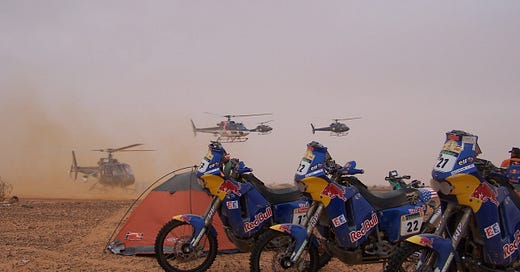This year’s Dakar Rally is the fifth edition in Saudi Arabia and the 46th year. The race begins on January 5th in Al-Ula. Americans in the race include Kellon Walch, Mitch Guthrie, Ricky Brabec, Skyler Howes, Mason Klein, Austin Jones, Jacob Argubright, Kyle McCoy, Weston Carr, and Seth Quintero.
Here’s an excerpt from The Real Stories of the Dakar.
Dakar, the final stop for the Dakar rally, is a land rich in African culture, a privilege only for those who have completed the journey. Dakar represents a monumental feeling of accomplishment to those who choose the journey, similar to climbing Mount Everest. The Dakar rally is the ultimate adventure ride, one that changes a person forever. Adventure riding changes a person and symbolizes why we yearn to explore the ends of the earth on a motorcycle; it’s truly an expression of the human spirit, truth, and our adventure in life. One time a year, their competitors set aside their artificial modern lives and exist face to face with humanity, staring directly into their souls. It is in Dakar where we find the spirit and are continually challenged. The joy, pain, and humility are revealed in each of us.
The Dakar rally has been around for decades. The word rally literally means to “find the way.” The Dakar rally is among the most famous of these events and is considered the Mount Everest of off-road racing. The difference between adventure riding and rally racing is simple: an adventure ride involves finding the way through various conditions and terrain, and a rally is a very long adventure ride combined with a race. The Dakar rally is a mass movement of motorcycles, cars, and trucks from place to place organized over vast terrains usually inaccessible by standard transportation. Most riders compete in the Dakar rally not to win the race but to complete the journey. It is life-changing and brings out the character of each person, who they truly are, and how one responds to danger and Mother Nature. As it existed in Africa, the Dakar rally traveled through exotic and sometimes mundane lands, crossing many different cultures. Better said, the Dakar rally is the return to the human adventure.
Many ask why people want to do the Dakar. Why would anyone want to be dropped off in the desert with minimal support, with a good chance that they will break down, sleep on the ground in a tent, with little possibility of taking a shower, often not even able to feed themselves, not finish, and a statistical chance of losing your life? The same can be said for anyone doing something they want to do in life. One answer to that question is that the Dakar rally delivers freedom. Not just any freedom but ordered or structured freedom. It means you are free to do as you please under the game’s rules. By definition, this is ordered play. Humans are born to play. We play the moment we are born, and as adults, we yearn to return to that playground in a metaphysical sense. Thierry Sabine must have felt this when he came to the Baja 1000 and devised a plan to emulate this in the African deserts.
Another answer to the question is that we all need a sustaining meaning in our lives. Sustaining, in this sense, means that through a catastrophe or difficulty, it is that thing that will sustain you through the pain, frustration, and sometimes terror. That thing cannot be happiness, clearly, because happiness does not generally occur during times of pain. You are happy when it’s over, but that’s about it. When people are dropped off in the desert, they are lost and abandoned. Perhaps not in a literal sense, but you don’t have your family next to you, your mechanics, your friends, and there’s no water truck coming; only a truck that is designed to pick you and your vehicle up, and you exit the game.
You only have your vehicle and navigation tools to help you travel from the bivouac you left to the bivouac you need to get to. When you are lost in the desert, these structures you have built around yourself protect you. This is true in every aspect of life, and this is the true spirit of Dakar. Preparation for the adventure means building a structure around you that protects and allows engagement in ordered voluntary play. The proper sacrifices must be made to have a proper structure, at least one with sustainable meaning. These sacrifices come in many forms. For some, it’s the right motorcycle, car, UTV, truck, gear, and supplies. One sacrifice that many ignore or acknowledge is that of friends and community. Dakar is a unique community that must be experienced to understand; it demands that you leave your everyday life behind for weeks and enter a new community with different rules to participate in. Those who remain pretentious in their ways often pay the price. Arrogance has no place when you are lost in the desert, upon which many of the legendary stories of Dakar are built. The spirit of Dakar is the adoption of voluntary responsibility. This is what levels the playing field during the Dakar. Whether you are privileged or have put everything you own into this human adventure (which many have), everyone is equal in the playground we call Dakar.




